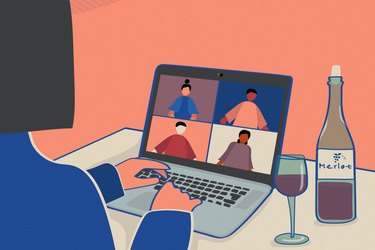
You may have seen — or even posted — memes about drinking during the novel coronavirus pandemic. Here's a popular one: "Studies show that if you have a glass of wine in each hand, you're 100 percent less likely to accidentally touch your face." Or, for another example: "You think it's bad now? In 20 years, our country will be run by people home-schooled by day drinkers."
While these messages might make you smile, laugh or nod your head in agreement, they reflect a sobering reality: Alcohol use is on the rise. Thirty-five percent of Americans report that they're more likely to drink during social isolation, and 22 percent stockpiled booze for the lockdown, according to a survey from Alcohol.org.
Video of the Day
Video of the Day
"In times of trauma, people end up drinking more to deal with stress and anxiety," says George F. Koob, PhD, director of the National Institute on Alcohol Abuse and Alcoholism (NIAAA). "People are also using alcohol to replace social interaction, because it temporarily dulls the pain of loneliness and isolation."
Get tips on how to stay healthy, safe and sane during the novel coronavirus pandemic.
Of course, we all know drinking's not great for us. The USDA's Dietary Guidelines recommend limiting yourself to one drink per day for women and two drinks daily for men, although an August 2018 study in the Lancet linked even small amounts to an increased risk of death and disease.
Still, in the grand scheme of things, is knocking back an extra glass or two really doing that much harm? After all, you might be thinking, we're in a global pandemic — cut us some slack!
To find out, we talked to experts about whether it's actually that big of a deal. Before fixing yourself that quarantini, read this.
Determine Your Risks
Some people are more prone to alcohol's deleterious effects than others. "In a healthy, young individual, increased drinking will have a lesser impact than for someone who is genetically predisposed to alcohol abuse or has a medical condition that might be exacerbated in the course of drinking," says Lawrence Weinstein, MD, chief medical officer of American Addiction Centers.
You're at a heightened risk for alcohol abuse if you have a family history of substance misuse. Mental health conditions — including anxiety, depression and personality disorders — are also risk factors. "Pregnant women, Asian Americans and people with liver dysfunction are also more vulnerable," Koob says.
Finally, if you're taking medication, adding alcohol to the mix can put your health in jeopardy. "For example, you can have a life-threatening event from combining alcohol and pain meds," Koob says.
Related Reading
A Slow Burn
Still, even if you're not considered high risk, docs aren't giving you license to get your lockdown happy hour on seven days a week. That's because drinking tends to be a slippery slope. Before you know it, one or two glasses of red wine a day turns into two or three and then three or four.
"However, the hallmark of alcoholism itself is denial," Dr. Weinstein says. "So even if, objectively, the number of drinks you're consuming per day steadily increases, there is a total cognitive disconnect."
In addition, for most people, the toll on your physical and emotional wellbeing is not immediately perceptible. "Alcohol abuse doesn't happen overnight — it progresses slowly but surely, and may take years to fully unfold," Dr. Weinstein says. "At first, our body has the capacity to adjust to a greater intake, but over time, that capacity is depleted."
As a result, drinkers may not realize the harm alcohol has caused until things have reached a boiling point: Your relationships are frayed, you're on thin ice at work and your health is failing. In fact, thanks to its insidious nature, alcohol use disorder has earned the nickname "silent killer."
Your Body on Booze
When it comes to the effects of alcohol, "no system is spared," Dr. Weinstein says. Here's how it takes a toll on some of your major organs:
- Heart: "Over time, alcohol abuse causes your heart muscle to increase in size, potentially leading to congestive heart failure or cardiopathy," Dr. Weinstein says.
- Brain: Since alcohol penetrates the blood-brain barrier, it directly affects your noggin. "Your brain decreases in volume with long-term, heavy drinking," Dr. Weinstein says. "In the short term, alcohol disrupts REM sleep, which is when your nervous system is rebooted and recharged." This can be detrimental to memory, concentration and motor skills, according to a 2013 review in Alcoholism: Clinical and Experimental Research.
- Pancreas: "Eventually, alcohol abuse can lead to diabetes, because alcohol disrupts the regulation of glucose," Dr. Weinstein says. "Diabetes, in turn, can trigger other complications like peripheral neuropathy, a type of nerve damage."
- Skin: Listen up, day-drinkers. "Alcohol makes your skin more susceptible to UV damage," Dr. Weinstein says. And, drinking alcohol is linked to an increased risk of melanoma, according to a February 2014 review in the British Journal of Dermatology.

Happy Hour Can Sabotage Your Career
If you want to be on your "A" game at work, booze might be a barrier. In the Alcohol.org survey, 32 percent of people said they were more likely to drink during work hours when they're at home.
Even if you're not knocking back beers on the job, being hungover is not a recipe for success. "The lethargy and malaise you feel leads to an impairment in functioning," Koob says. You might miss deadlines or virtual meetings. And remember: Since drinking screws up your sleep, you'll be less focused and more likely to make mistakes.
Related Reading
Your Relationship Might Suffer
Although Koob points out that most Americans drink without issue, the NIAAA estimates that 15 million people are "problem drinkers," who become belligerent or out of line when they're under the influence.
"For problem drinkers, their disinhibition grows more dramatic as their consumption increases," Koob says. "As a result, they might say inappropriate things to their significant other, get into verbal fights and beyond — and the fallout can be more extreme when you're sheltering in place together."
"When the alcohol wears off, pain and fear come back with a vengeance — it's like you've let the demons out."
Stress Skyrockets
If you're cracking open a White Claw to freeze out bad feelings like anxiety, boredom, overwhelm or loneliness, it's likely to backfire. "Your brain reacts to numbness by activating systems to counteract it," Koob says. "When the alcohol wears off, pain and fear come back with a vengeance — it's like you've let the demons out."
That, of course, can drive you to drink even more, triggering a dangerous domino effect.
Related Reading
Do You Have a Problem?
Pay attention anytime your alcohol consumption surpasses the dietary guidelines. "Early signs that something's not right include failing to meet your obligations at work or home," Koob says. "Another is if your relationship is deteriorating."
It's also worth examining your motivations for picking up a glass. "There is generally no harm in using alcohol as a social lubricant — for instance, by having a beer during a Zoom call with friends," Koob says. "But drinking as a coping mechanism for stress is a sign of misuse."
If you've been sipping more than usual, take a couple days off and then evaluate how things are going. Do you feel better? Are you having more positive interactions with your significant other? Has your job performance improved? "If there's no change, then you are probably doing OK," Koob says.
Better Coping Strategies
One of the best ways to cut back on booze is hanging with friends, according to Koob. "Socializing is a powerful source of pleasure," he says. "When you're isolated, you are more likely to use alcohol as a substitute."
So, organize virtual hangouts with friends and family members, plan a standing weekly phone call with a loved one or meet up for an outdoor get-together like a picnic or walk where you can follow safe social distancing measures.
Koob points out that close friends are also a good sounding board to talk to about your worries; if you have an outlet to vent these feelings, you'll be less likely to try to dull them with booze.
Then, find healthier ways to relax. "Sticking to a regular sleep schedule and getting more exercise will allay stress," Koob says. Since yoga is a terrific mood-booster, according to Harvard Health Publishing, try streaming an online class, or enjoy an extra few minutes walking your dog.
For some, boredom may spur boozing. "Boredom is a driving force for stress and anxiety," Koob says. "To avoid being sucked into that spiral of negativity, get yourself engaged in activities that make you feel good."
Some ideas: Sign up for an online workshop (anything from knitting to writing to playing the guitar), grow veggies, Marie Kondo your closet, cook a recipe from a new country each day, learn a language or give your walls a fresh coat of paint.
Another option is virtual Alcoholics Anonymous, which offers meetings via video, phone, email and chat groups.
Related Reading
So, How Bad Is It Really That You're Drinking More Than Usual?
Put the cork back in the bottle. Boozing during quarantine is not a great idea.
"Any time you start increasing your intake past the dietary guidelines, you need to keep an eye open," Koob says. "If you're having an extra glass of wine or beer with dinner, not experiencing any negative side effects and not at high risk for alcoholism or another medical condition, you might be OK. But drinking can quickly become a habit, so it is something you should periodically evaluate."
- Alcohol.org: "Drinking Alcohol When Working from Home"
- The Lancet: "Alcohol use and burden for 195 countries and territories, 1990–2016: a systematic analysis for the Global Burden of Disease Study 2016"
- USDA Dietary Guidelines 2015-2020: "Alcohol"
- British Journal of Dermatology: "Alcohol drinking and cutaneous melanoma risk: a systematic review and dose–risk meta‐analysis"
- Alcoholism: Clinical & Experimental Research: "Alcohol and Sleep I: Effects on Normal Sleep"
- NIAAA: "Alcohol Use Disorder"
- Harvard Health Publishing: "Yoga for Anxiety and Depression"
- Cornell Chronicle: "Spending Time in Nature Reduces Stress, Research Finds"
- Frontiers in Neuroscience: "The Risk Factors of the Alcohol Use Disorders—Through Review of Its Comorbidities"
- Alcohol.org: "Is Alcoholism Inherited?"
Is this an emergency? If you are experiencing serious medical symptoms, please see the National Library of Medicine’s list of signs you need emergency medical attention or call 911.
